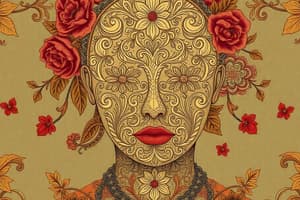Podcast
Questions and Answers
Philosophy is defined as the study of knowledge or wisdom from its Latin roots, philo (love) and ______ (wisdom).
Philosophy is defined as the study of knowledge or wisdom from its Latin roots, philo (love) and ______ (wisdom).
sophia
Socrates emphasized the importance of knowing or understanding oneself through the command of the Delphic Oracle to '______ Thyself'.
Socrates emphasized the importance of knowing or understanding oneself through the command of the Delphic Oracle to '______ Thyself'.
Know
Socrates' unique style of asking questions is known as the ______ Method.
Socrates' unique style of asking questions is known as the ______ Method.
Socratic
According to Socrates, the self is ______, which means composed of two things.
According to Socrates, the self is ______, which means composed of two things.
The ______ realm is composed of elements that are changeable, temporal, and imperfect, such as the physical world.
The ______ realm is composed of elements that are changeable, temporal, and imperfect, such as the physical world.
The ideal realm is characterized as ______, unchanging, eternal, and immortal.
The ideal realm is characterized as ______, unchanging, eternal, and immortal.
The Greek philosophers moved away from ______ to understand reality.
The Greek philosophers moved away from ______ to understand reality.
Socrates' teachings are primarily known through the writings of his student ______.
Socrates' teachings are primarily known through the writings of his student ______.
The cause of sin or evil is an act of man's ______.
The cause of sin or evil is an act of man's ______.
Moral goodness can only be achieved through the grace of ______.
Moral goodness can only be achieved through the grace of ______.
Real happiness can only be found in ______.
Real happiness can only be found in ______.
Rene Descartes is famous for the principle 'cogito, ergo ______'.
Rene Descartes is famous for the principle 'cogito, ergo ______'.
According to Descartes, doubting makes someone aware that they are a ______ being.
According to Descartes, doubting makes someone aware that they are a ______ being.
John Locke is famous for his concept of 'Tabula ______'.
John Locke is famous for his concept of 'Tabula ______'.
According to Locke, the self is defined by ______.
According to Locke, the self is defined by ______.
A person is a thinking, intelligent being who has the abilities to ______ and to reflect.
A person is a thinking, intelligent being who has the abilities to ______ and to reflect.
For Socrates, a human is composed of body and ______.
For Socrates, a human is composed of body and ______.
Plato introduced the idea of a three-part soul/self that includes reason, physical appetite, and ______.
Plato introduced the idea of a three-part soul/self that includes reason, physical appetite, and ______.
Plato's Reason enables humans to think deeply, make wise choices, and understand ______ truths.
Plato's Reason enables humans to think deeply, make wise choices, and understand ______ truths.
In his metaphor, Plato described the soul as a winged chariot drawn by two powerful ______.
In his metaphor, Plato described the soul as a winged chariot drawn by two powerful ______.
St. Augustine characterized the body as a 'snare' or 'cage' of the ______.
St. Augustine characterized the body as a 'snare' or 'cage' of the ______.
According to St. Augustine, the human nature is composed of two realms: God as the source of all reality and truth, and the ______ of man.
According to St. Augustine, the human nature is composed of two realms: God as the source of all reality and truth, and the ______ of man.
Plato also referred to the divine essence as ______.
Plato also referred to the divine essence as ______.
The charioteer in Plato's metaphor represents ______, whose task is to guide the chariot to the eternal realm.
The charioteer in Plato's metaphor represents ______, whose task is to guide the chariot to the eternal realm.
David Hume claimed that there is no ______.
David Hume claimed that there is no ______.
According to Hume, the contents of our experience include 'impressions' and ______.
According to Hume, the contents of our experience include 'impressions' and ______.
In Freud's dualistic view, the self is divided into the conscious self and the ______ self.
In Freud's dualistic view, the self is divided into the conscious self and the ______ self.
The unconscious self is governed by the ______ principle.
The unconscious self is governed by the ______ principle.
Freud's conscious self is governed by the ______ principle.
Freud's conscious self is governed by the ______ principle.
Freud considered himself to be the Father of ______.
Freud considered himself to be the Father of ______.
Consciousness allows individuals to believe they are the same identity in different ______.
Consciousness allows individuals to believe they are the same identity in different ______.
According to the reflective analysis, an individual experiences the self in everyday ______.
According to the reflective analysis, an individual experiences the self in everyday ______.
According to Immanuel Kant, if the self failed to do this synthesizing function, there would be a chaotic and insignificant collection of __________.
According to Immanuel Kant, if the self failed to do this synthesizing function, there would be a chaotic and insignificant collection of __________.
Kant concluded that all objects of knowledge, which includes the self, are __________.
Kant concluded that all objects of knowledge, which includes the self, are __________.
Paul and Patricia Churchland argue that concepts like belief, desire, and fear actually misrepresent the reality of __________.
Paul and Patricia Churchland argue that concepts like belief, desire, and fear actually misrepresent the reality of __________.
Neurophilosophy, coined by Patricia Churchland, applies __________ to philosophical problems.
Neurophilosophy, coined by Patricia Churchland, applies __________ to philosophical problems.
Patricia Churchland claims that a man's brain is responsible for the identity known as __________.
Patricia Churchland claims that a man's brain is responsible for the identity known as __________.
According to Maurice Merleau-Ponty, the division between the mind and the body is a product of __________ thinking.
According to Maurice Merleau-Ponty, the division between the mind and the body is a product of __________ thinking.
The philosophy of neuroscience studies the relationship between __________, neuroscience, and psychology.
The philosophy of neuroscience studies the relationship between __________, neuroscience, and psychology.
Churchland and others view the self from a __________ point of view, asserting that mental states can be reduced to physical brain states.
Churchland and others view the self from a __________ point of view, asserting that mental states can be reduced to physical brain states.
Flashcards are hidden until you start studying
Study Notes
Understanding the Self
Philosophy Fundamentals
- Philosophy stems from Latin roots: "philo" (love) and "sophia" (wisdom).
- Regarded as “The Queen of All Sciences” with roots in all scientific disciplines.
- Early philosophers, especially the Greeks, shifted from myths to seeking reality through rigorous questioning.
Socratic Philosophy
- Socrates emphasized the importance of self-knowledge with the maxim "Know Thyself".
- His philosophy divides the self into two realms: the physical (changeable, temporal) and the ideal (unchanging, eternal).
- The physical world incurs sensory changes, while the ideal realm represents concepts of beauty, truth, and goodness.
- Socrates defined humans as composed of body (physical realm) and soul (ideal realm), with the soul being the eternal self that maintains identity through changes.
Plato's Perspective
- Plato, Socrates' student, proposed a tripartite soul: reason, physical appetite, and spirit.
- Reason is the divine essence aiding in deep thought and true understanding.
- Physical appetite encapsulates basic biological needs.
- Spirit represents basic human emotions, depicted metaphorically as a chariot driven by reason controlling two horses (spirit and appetite).
St. Augustine's Contributions
- Blended philosophy with Christian theology, seen as the first Christian theologian.
- Presented the body as a "cage" for the soul but later viewed it as the soul's "spouse".
- Argued human nature consists of two realms:
- God as the eternal truth and source of reality.
- The fallen state of man influenced by free will, requiring divine grace for moral goodness.
Rene Descartes' Ideas
- Established the foundational concept "Cogito, ergo sum" (I think, therefore I am).
- Advocated for doubt as a path to true knowledge.
- Differentiated between the thinking self (soul) as non-material and the physical body as material and governed by natural laws.
John Locke's Identity Theory
- Introduced "Tabula Rasa" (Blank Slate), stressing the significance of nurture.
- Defined personal identity through consciousness and reflective thinking.
- Emphasized the continuity of consciousness as crucial for identity over time and space.
David Hume's Empiricism
- Controversially argued that the self does not exist as a fixed entity.
- Identified two primary components of experience: "impressions" (sensations) and "ideas" (derivative thoughts).
Sigmund Freud's Dualistic Self
- Proposed a dualistic view: an unconscious self driven by pleasure, and a conscious self governed by reality.
- Stressed the importance of the conscious self in balancing primal impulses from the unconscious.
Immanuel Kant's Transcendentalism
- Suggested that self-awareness derives from the mind organizing impressions rather than direct experience.
- Proposed that true reality (including the self) is ultimately unknowable.
Paul and Patricia Churchland's Neurophilosophy
- Argued that concepts of self such as beliefs and emotions misrepresent brain activity.
- Introduced neurophilosophy, linking neurological processes with philosophical inquiries about self and mind.
- Proposed that the self arises from brain activity and physiological processes.
Maurice Merleau-Ponty's Holistic View
- Criticized the mind-body division as misleading.
- Advocated for a seamless unity of mental and physical experiences in the understanding of self.
Studying That Suits You
Use AI to generate personalized quizzes and flashcards to suit your learning preferences.




